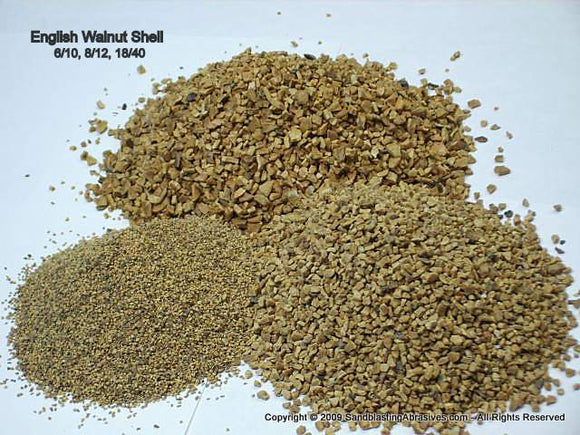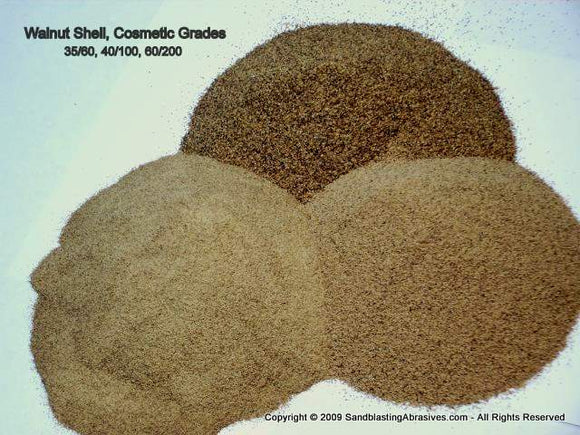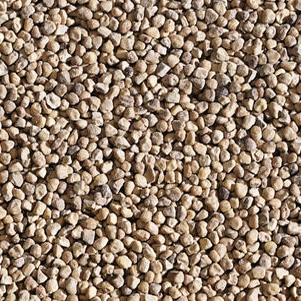Walnut shell is a soft abrasive, often used for deflashing, deburring, and finishing operations, as well as filler and extender applications. We generally recommend walnut shell when someone wants to remove a surface coating/contamination without damaging or profiling the substrate, such as surface prep of a log home prior to staining, or removing graffiti.
- Soft, will not cause pitting (excellent for jet engine parts, turbines, pistons, etc.)
- Walnut Shell will likely leave no profile on steel. It is far less abrasive than other sandblasting medias, such as crushed glass or copper slag. It can leave a profile on soft substrates such as aluminum, copper, brass in coarse sizes such as the 12/20 and 8/12.
- Excellent for de-flashing and de-burring
- Excellent for wheel blasting, air blasting, and tumbling, graffiti removal, steam turbines, mold cleaning, engine clean-outs, log home blasting, boat blasting
- No risk of Silicosis
- Mohs Hardness: 3.5 = Rockwell 91 = Brinell 190
- Long Lasting
- Oil and Water Resistant
- Biodegradable
- Re-Useable
- Allows for preservation of base/primer, while removing top layers of paint (excellent for air craft carriers, submarines, boats.) For steel boat hulls, you can use coarser sizes like a 12/20, but for very delicate fiberglass hulls you may want to use something as fine as the 30/100 - start with low pressure and work your way up if needed.
- Angular and multi-faceted
- Flash Point: 380 degrees F
- Charring Temp.: 470 degrees F
- PH at 25 degrees C in neutral H2O: 4-6
- Free Moisture @ 80 degrees C, 15 HRS: 3-11%
- Specific Gravity: 1.2-1.4
- Dry Packing Density: 22-53 lbs./cu.ft.
- Walnut shell flour and filler sizes also available.
Shipping: Usually sold by the pallet or 2,000 lbs. (40, 50lb bags.) with multiple shipping points. You can, however, buy single (45 lb) bags of a very limited number of grit sizes, at the top of this page. Please email us for a custom freight quotation on orders over 250 lbs. We will need to know your ship-to address, and whether or not you have a loading dock on your end to receive the media.
Packaging:
- 50lb bags, 40 bags per pallet. 2,000 lbs per pallet.
- Minimum Order: 1,000 lbs or 20 bags on a pallet. You can, however, buy single 45lb bags off this page. NOTE: Single bags are now 45 lbs! We are no longer shipping single 50 lb orders, due to UPS charging large fees for packages that weigh over 50 lbs.
- 2,000 lbs super sacks also available, one sack per pallet.
Tips:
- Media consumption will vary dramatically depending the user's job, but 2# per cubic foot is a decent ballpark number to go by. This is not a guarantee or an absolute, as the actual number will tie in with blasting pressure, substrate and toughness of the coating.
-
It is always recommended to start with a low pressure and work it up as needed. Actual pressure will be related to the substrate and how much damage you want done to it, if any. For general aggressive sandblasting, a 80-100 psi at nozzle is common.
-
Consumption: When blasting metal - 5-10lbs per sq. ft. is a good place to start. Other applications will run you much less, around 1-2 lbs per sq ft.
-
Anti-Slip Applications Consumption Rates: Varies dramatically, but a good ballpark is to figure 5-10 lbs per square foot of area. When mixing it directly into a paint or coating, use 2lbs per 5 gallons of paint as a start.
-
Any grit size is suitable for blasting metal. If there are grooves and fine areas, you will need a finer media to get into them. If it's a flat surface, the larger the better (metal substrates only).
-
If you want to do more than remove a coating, and want to effect the substrate, then going to a coarser size than normal would be the best place to start.
-
Cosmetic walnut shell is not sterilized, you will have to do this yourself.
- Blasting Brick: Pay attention to the condition of the mortar! Walnut usually does an effective job of removing paint from brick without damage, but if the mortar is in poor condition, it may be too aggressive and will pit/damage the mortar. Use a finer size in this case, and adjust your pressure.
- Blasting Boat Hulls: If it's a steel hull, a 12/20 should work fine. If it's wood or fiberglass, you will want to use a smaller size, even as low as 30/100 if it's delicate. Start with low pressure and work your way up if needed.
- Blasting Log Homes: A 3060 Black Walnut is preferred by most people, although a 2030 can be used also. Black Walnut will leave less scarring and pitting on the logs because the shell is a bit thicker than English walnut. If what you want to remove has good adhesion, and/or multiple coats of paint, then the coarser 2030 would be preferred. Just know you can overdo the 2030, which can eat into the logs if your coating is thin and easy to remove. Start with a lower pressure and increase it as needed.
- Cleaning carbon build up in direct injection engines: Try the 18/40 (500 lbs is minimum order for this size). Request A Quote Now
- Some government jobs and oil field drilling applications will require black walnut. Ditto on some oil filter applications.
Grades Available For Purchase - depending on the shipping origin:
- 6/10
- 8/12
- 12/20
- 20/30
- 18/40 (used to polish brass gun shell casings, or corn cob 14/20) This size also used for log home/wood blasting
- 30/60 - A 3060 Black Walnut is preferred by most people, although a 2030 can be used also if logs need a bit more work
- 30/100 - mainly a flour
- 40/100 Flour
- 60/200 Flour
- -100 Filler
- -200 Filler
- -325 Filler
Description:
- Ph: 4 to 5 at 25 degrees Celcius
- Typical Packaging: 45 lb bag or by net ton in 50 lb bags (2,000lbs per pallet)
- Shipping Point: East Coast, West Coast, and Chicago
- NMF Classification: Class 55, Item 175480
- Color: Light Brown
- Hazardous? No
- Disposal: According to Federal, State, Local regulations
- Sterilization: No, media is not sterile
- Grain Shape: Appears granular or powdery depending on grade
- Specific Gravity: 1.2 - 1.35 (Walnut Shell)
- Minimum Order Quantity: 2000 lbs, 40, 50lb bags minimum order. Or you can order a 45lb box at top of this page.
- Type: English (Black walnut is available upon request)
- Bulk Density: Approximately 40 lbs per cubic ft., varies by grade









